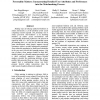183 search results - page 2 / 37 » Learning Social Preferences in Games |
BCSHCI
2008
14 years 9 days ago
2008
Head-Up Games [19,20] attempt to combine the technological benefits of modern electronic games with the social and physical advantages of traditional games. To demonstrate this co...
SIGECOM
2006
ACM
14 years 4 months ago
2006
ACM
In traditional game theory, players are typically endowed with exogenously given knowledge of the structure of the game—either full omniscient knowledge or partial but fixed in...
HICSS
2007
IEEE
14 years 5 months ago
2007
IEEE
Finding ways of reducing undesired behavior in online interactions is at the forefront of the social computing research agenda. One promising way to reduce perceived “bad behavi...
CHI
2004
ACM
14 years 11 months ago
2004
ACM
This position paper describes the implementation and initial findings of a game called Personal Investigator (PI). PI is an online 3D detective game that implements a model of Bri...
ICMI
2009
Springer
14 years 5 months ago
2009
Springer
The influence of multimodal sources of input data to the construction of accurate computational models of user preferences is investigated in this paper. The case study presented...


